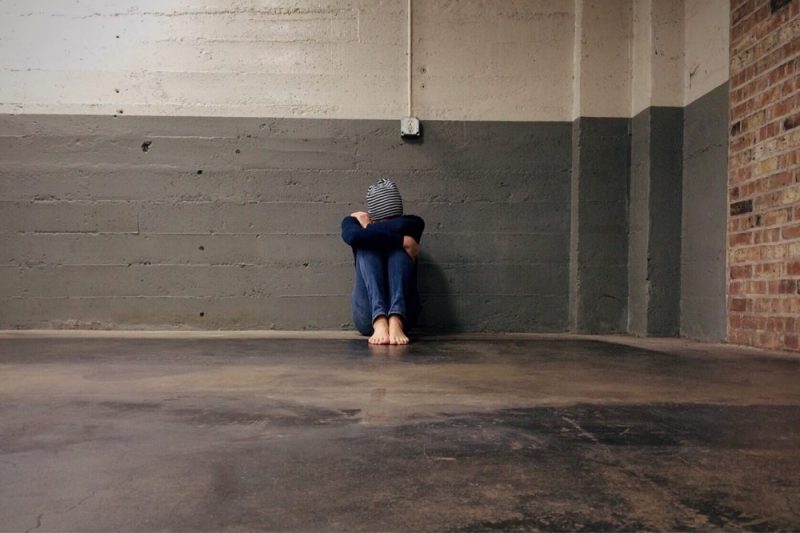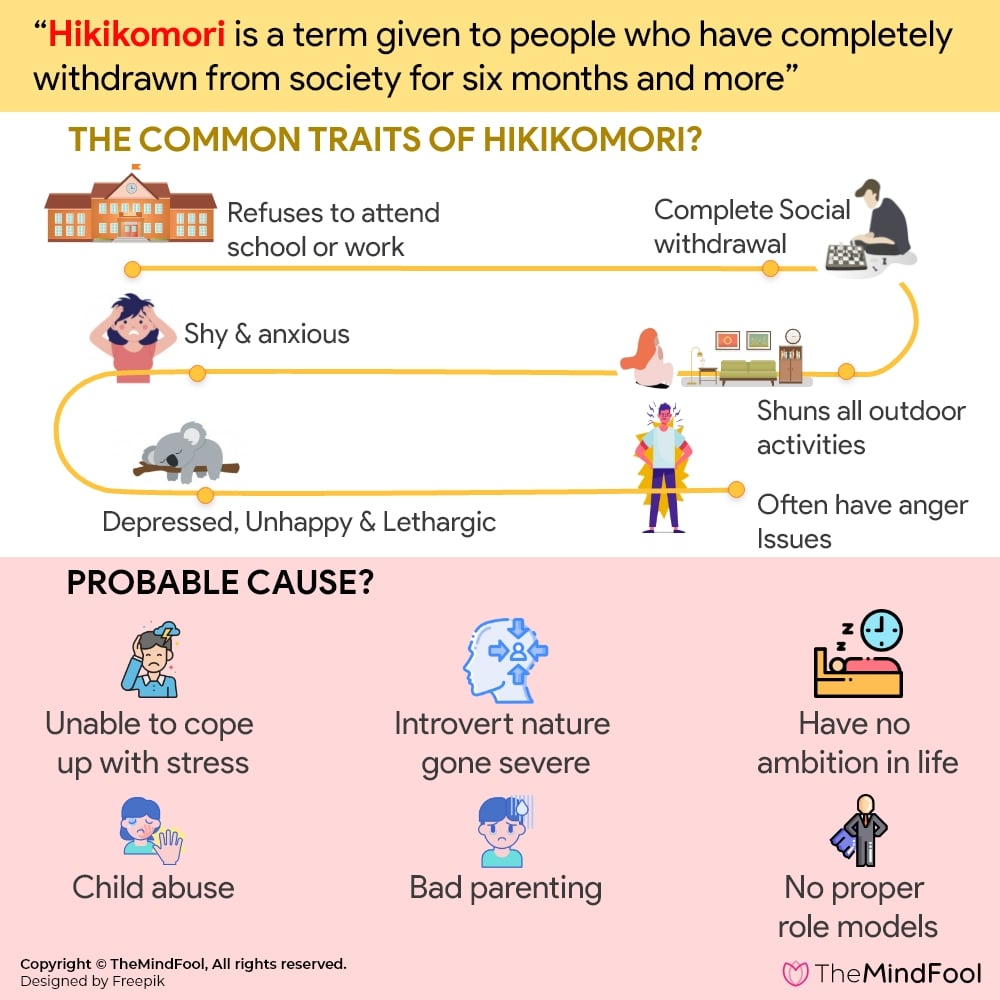
Today’s fast-paced society has changed our lifestyle for sure. Continuously absorbed in social media, and glued to our mobile phones we are slowly moving towards our graves! Youngsters are getting caught in this virtual world and disappearing from the real one. Several young people are withdrawing themselves from society and leading a secluded life. Here comes a crucial and tragic situation of modern times – Hikikomori.
Hikikomori Definition
SUMMARY
Hikikomori is a term for people who have completely withdrawn from society for six months and more.
Hikikomori is a Japanese term for a psychological condition in which people isolate themselves completely from others. The term refers to the person as well as the condition. These people choose an absolutely confined life for themselves.
They do not leave their homes and in many cases the very bedroom for months or years. These social recluses refuse to meet anyone or go anywhere. Hikikomori are mostly men in their teenage or young adulthood who have chosen to live a solitary life for a stretch of six months or more.
Hikikomori Signs
Some of the common signs for this condition are:
- It often starts with refusing to attend school or work.
- These people do complete social withdrawal, they do not go out of their house or meet anyone.
- Hikikomori shuns all outdoor activities. They refuse to go to school or work. They completely avoid meeting people.
- Hikikomori has no friends.
- They are shy and anxious.
- The affected people are depressed and lethargic.
- They often have anger issues and do not like to communicate.
Prevalence of Hikikomori Case
According to statistics by the Japanese Government in 2010, there are about 700,000 Hikikomori within Japan. Although the name originated in Japan, Hikikomori occurs in large numbers in several other countries as well! Some of these countries are the USA, Morocco, India, South Korea, France, Spain, and others.

10 Probable Causes of Hikikomori
Psychologists are saying there could be several reasons behind this mental condition. Hikikomori includes school dropouts to sacked employees. The major reasons are –
1. Hikikomori are unable to cope up with stress
These young people are not able to cope up with the continuous stress from society. Many of these Hikikomori have been academic failures. Therefore, they avoid social contact in fear to be ridiculed by others.
Their parents had put so much high hopes on them that a dissatisfactory performance at school had created a dangerous impression in their young minds. They do not find themselves worthy or needed by the society. Therefore, they want to live as social recluses.
2. Introvert nature has gone severe with Hikikomori
They were introverts from the beginning therefore, they could never make friends. Besides that, most of these kids are the only child of their parents. Because their parents were always busy with work, these children never got company at home. So, now they have totally withdrawn from everyone.
3. Tough education system
Some of these Hikikomori have shunned attending high school in fear. The Japanese educational system is challenging, the syllabus being elaborate and the pressure on the young learners is tremendous.
Besides that, toddlers are also required to sit for entrance exams! The school education becomes harder as the child moves to higher classes. The students are required to appear for university entrance exams. Selection examinations in elite universities are even arduous.
Therefore, there is always anxiety and stress in the students. A sense of shame acts in young minds when they are not selected!
4. Child Abuse
Some of them were victims of abuse as a child. The trauma had deeply wounded their mental health. Therefore, they are scared to leave their rooms.
5. Dislike norms & rules
A huge number of Hikikomori has angst on society in general. They do not like societal norms. Maybe they are sick of the rules and norms of society. Therefore, they have refused to participate in society.
6. Hikikomori have no ambition in life
Hikikomori has lost interest in life because of trauma or frustration. Most importantly, ambitions and hopes have abandoned them and mere existence is all they seek!
7. Hikikomori have addiction to the internet
The virtual world has given them support in the real world and it’s people failed to give them! Therefore, they are totally addicted to the Internet.
8. Bad parenting
Many of these people had ignorant parents. They were not encouraged by their parents to develop healthy relationships while they were young.
9. No proper role models for Hikikomori
They have not seen their parents socialize! Parents who lead a busy, unsocial life often unintentionally set an example for their children to withdraw from society.
10. Inactive childhood
As children, they didn’t pursue any outdoor activity. They were always immersed in computers and nobody rectified their habit. Therefore, as grown-ups, they have decided to completely withdraw from society!
Some case studies of Hikikomori
• According to the Japanese Government estimates, the country has over 1.15 million social recluses. Although some experts suggest that the figure could be way above 10 million people! Source: nippon.com
• Japanese psychiatrist and professor, Tamaki Saitō addressed at the press on this subject recently. In fact, it is he who have coined the term “Hikikomori” and brought this concern to public eye through his book, Hikikomori: Adolescence without End. His book is based on endless research work for decades and it’s beneficial to the Japanese society as well as for other modern societies. Because, this book gives us clear understanding of this problem.
• There are instant examples of such people who have completely stepped back from society and leading isolated lives. Most of these recluses had started this life in their adolescence and average age of them is 14 – 40. There are instances where even family members are unable to communicate with these people. Cases of murders and suicides by these recluses have been cited. As a result some people perceive Hikikomori as quite dangerous! Source: economist.com
The aged parents of Hikikomori are extremely worried about the fate of their children. Because these Hikikomori would not be able to survive without their parents.
• Japanese Government is trying their best to assist the affected families. Counselors are provided to families who would seek out help. Support groups are flourishing all over the country.
• There are organizations that provide rental sisters to coax the Hikikomori to leave their rooms. Some positive outcomes of such efforts have also been recorded. Few Hikikomori are leaving their homes at least for some time to do part-time, low-skill jobs.
The impact of Hikikomori
Millions of young people refusing to participate in work have an obvious direct impact on society. The nation suffers because it loses valuable contributions from several young men. Besides that, the parents and family members of such people are the worst sufferers because they have to solely provide for financial support.
Is Hikikomori a severe issue?
Hikikomori is not just a condition prevalent in Japan but it’s occurring in many parts of the world. It is particularly prevalent in fast-paced societies. Most importantly, it is a crucial issue. If not handled seriously, this can become a widespread condition. There are several issues to be dealt with. The question is – Are we willing to go deeper into the matter?
6 Treatment & Solutions to Deal with Hikikomori
This is a psychological condition indeed. Because millions of people around the world are suffering with this social health condition there must be some deep underlying cause. Therefore, we must be willing to help the affected unfortunate young men.
1. Empathy towards one another
A primary way to safeguard young people from this condition would be empathy. In today’s fast world nobody is bothered about others. Because of self-centeredness, we are losing our humanity. The exceedingly challenging education system, competition, and comparison between peers are often a reason that’s forcing the young generation to succumb to the pressure.
2. Spending time with family
Parents often do not spend quality time with their children because they are busy with work and other commitments. Particularly those who are single child deal with loneliness from a young age. This loneliness is often leading to social exclusion.
3. Learning good parenting skills
Most importantly, parents should learn about good parenting. In Japan and most other countries, Hikikomori are young males. In the male-dominated society, the pressure is, particularly on the men. From childhood, parents are holding seemingly big expectations from their sons.
When these boys fail to meet up with parental expectations they are scared to go out and face other people. If their parents wouldn’t have pressurized so much they would not have selected this life of seclusion.
4. Dealing with internet addiction
With technological innovations, all of us are practically moving towards an isolated existence. Social media, games and “click-and-get-everything–at–your–fingertip” apps have enslaved us!
Life has become easier and we have simply become lazy. Often we are so much engrossed in Cell Phones that we forget to communicate with the people around us. Real conversations are disappearing behind texts and emojis. If we do not check this habit, most of us would become Hikikomori in the near future.
5. Therapy & counseling
The families of Hikikomori must be willing to cooperate with the support groups. Counseling is mandatory and it can help these people to come out of their self-imprisonment and join the society.
6. Improvising the education systems
The education system needs reformation. Constant evaluation process, tough competition, and outdated grading system must be corrected. Changes in syllabus and evaluation methods are happening all over the world but it should be implemented in the classrooms! Parents and teachers should be more supportive and friendly.
Ultimately our grades do not define our character or ability. Children should not be pressurized to establish a career in a school subject because they might be good at something out of the school syllabus! Each child has their own capacity and interest. Teachers should encourage the students’ strengths and not highlight their weaknesses.
Final Thoughts
Hikikomori are mostly young men who are leading confined lives at their parental homes. They have stopped interacting with others and have not stepped out of their rooms for six months or more. It’s a psychological condition that can arise from fear, abuse, frustration, shame or depression. This situation has recently become a global issue.
Many people think that Hikikomori are lazy teenagers who never learned to face the challenges of life. The reality is that these young people were often forced to choose this life of seclusion. They never got a normal upbringing! Maybe they have been bullied, assaulted or pressurized so much that they are now scared to face people. Today’s fast life and technological advancements have triggered the condition.
Although Hikikomori has been first reported among Japanese youth but this condition is a common phenomenon in most countries. We must be aware of this situation to handle it properly. Empathy, therapy, and open communication are the only ways to bring the Hikikomori from their closed doors to normal livelihood.
Ishita is a published author, poet and freelance writer. Being an avid reader from early childhood, she has always loved books more than anything else in the world! At the start of her career, she has worked in the corporate as well as the academic sector being a double master's degree holder - M.Sc and MBA. But now she is a fulltime writer. She believes words have immense power and writers can make a huge impact in the world! She wants to bring positivity into the lives of the readers through her association with TheMindFool.
